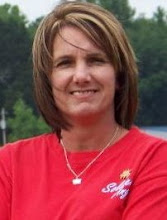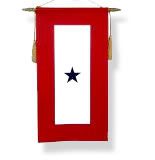Remembering Our Fallen & Wounded on this Memorial Day
U.S. fatalities in OEF and OIF
Reported Deaths: 4081
Confirmed Deaths: 4080
OUR WAR DEAD: "The Secretary of the Army has asked me to express his deep regret ..."
Notifying the family about a soldier's death is almost always done in person, and it's always difficult. A father and a notification officer recall the sad morning they met.
By Moni Basu
Maj. Michael Hulsey pulled into the long driveway at the house in Sharpsburg, wearing his Class A uniform and accompanied by a chaplain. Hulsey had been trained for this duty, had volunteered for it, but this was the first time he had been called on to carry it out.
He got out of the van and began walking toward the house. A pit bull blocked the way, barking maniacally.
The night before, Robert Stokely had offered prayers for the safety of his son, Michael, and then stepped out onto the front porch. He gazed at the moon, as he often did, taking comfort in knowing that Michael, at war in Iraq, would see that same moon in just a few hours.
Stokely went back inside, drifted into his son's room and fell asleep there.
Hulsey took the call that same night: Spc. Michael Stokely had been killed in the town of Yusifiyah, southwest of Baghdad, by an IED.
Hulsey, now 37, had volunteered for the job of casualty notification officer. The Georgia National Guard needed such officers across the state after the 48th Infantry Brigade deployed to Iraq. Timely notifications are essential, Hulsey said, in an era when news travels lightning fast. Families are entitled to hear about a soldier's death directly from the military, not from neighbors or the news.
That's why Hulsey got the call that night. His house in Coweta County is just a short distance from the Stokely residence. He could get there quickly. But Army protocol prohibits knocking on the next of kin's door after 10 p.m., so Hulsey would have to wait until the next day.
Now it was a little after 6 a.m., and Hulsey was at Stokely's house. In his training, Hulsey had learned: Look your best, treat the family with the utmost respect, and don't use the phone. Casualty notification is a face-to-face business.
Officer and chaplain
He hated the thought of calling, but the agitated dog left him little choice.
The ringing phone awakened Robert Stokely, and he jumped out of bed to get it. Outside he could hear Michael's pit bull, Patches, barking crazily. He didn't think much about it; Patches was always barking.
"Hello, Mr. Stokely? This is Major Hulsey. I'm here with the chaplain. We need to speak to you urgently but we can't get to you because of your dog."
Eleven soldiers with the 48th Brigade had been killed in late July and early August of 2005, and Stokely had made it a point to inquire about casualty notification procedures. He knew what was coming.
"I'll be right there," Robert said on the phone.
He ran as fast as he could to the front door and up his driveway that snakes uphill before it meets the road. Halfway up, he saw their parked van.
Hulsey saw the father running toward him up the driveway. Hulsey's stomach was knotted. He felt an intense rush of sorrow. He did not want to be the one to deliver this news.
But Robert Stokely already knew. When you see a uniformed officer and a chaplain in your driveway, your son is dead.
Stokely approached the two visitors.
"Is my boy dead?" he said.
Hulsey began to deliver the ritual words: "I regret to inform you. ..." It came out pretty much the way Hulsey had rehearsed it. He told Stokely he was extremely sorry. The chaplain offered words of faith and comfort.
Standing before the officer and the chaplain, Stokely heard the words "... regret to inform you that your son, Specialist Michael Stokely, was killed by a roadside bomb this morning at 2:20 a.m."
The major may have said something else, but Stokely doesn't remember.
The planes may have been taking off from nearby Hartsfield-Jackson airport, but Stokely didn't hear them.
His neighbor may have been cranking his diesel truck, but Stokely didn't notice that either.
He leaned on his car, which helped to keep him upright. His mind began racing: What do we do? What do we do?
'Have you told his wife?'
Suddenly, as though a hypnotist had snapped him back from his daze, Stokely blurted out a question:
"Who else was with him? Who else got killed?"
Stokely could tell that the notification officers were shocked by this question. But he knew many of Michael's friends. He wanted to know they were OK. He wanted to know who was hurt, so he could call their mothers, fathers, wives.
No one else died, Hulsey told him. But a few soldiers were injured.
Stokely's mind switched gears again.
"Have you told his wife?" he asked, thinking of Niki, then 20, whom Michael had married eight days before he deployed.
"Wife?" they asked.
They knew of no wife. But they had sent a notification team to Michael's mother Melissa's house. Robert and Melissa divorced when Michael was young; she lived in Loganville. Michael had lived with his mother most of his life, but he had moved in with Robert before joining the Army.
Stokely panicked. Niki lived in Loganville, too. News would spread fast. He didn't want her to hear secondhand that her husband was dead. "You have to send a team to her house," he insisted, running back inside to call Niki. He begged her to stay at home because, he said, he had to come over to speak to her about plans.
Twenty minutes had passed since Stokely found out that Michael was dead. The casualty notification officer and the chaplain were still waiting outside. They asked if they could come inside.
Robert told them no. He wanted to tell his wife Retta, his daughter Abbey and son Wes the news himself.
He remembers the major and the chaplain as polite, sympathetic.
"I wasn't a very good host," Stokely, 55, said in an interview last week. "I should have invited them in, treated them better. I feel bad about it."
Hulsey, also interviewed last week, says the Stokely notification was one of the hardest things he has ever done.
"I was the one delivering the worst news of his life," he said. "There's no easy way to do it."
Michael Stokely, promoted posthumously to sergeant, died Aug. 16, 2005, at the age of 23. The Iraq war's toll has now surpassed 4,000, meaning there are many thousands of American families who have heard the words "We regret to inform you ..."; families who have felt what Robert Stokely felt on that August morning.
In an e-mail to the AJC just days before Memorial Day, Stokely, who is the Coweta County solicitor, wrote:
It hurts me deeply to let myself think about that morning, much less talk about it. But I do so because I think we live in a world where war will never cease to be a part of our lives. Many are to face what our family faced that morning, and they too will begin a journey we have now been on for the last three years. Maybe, just maybe, our story is a flicker of light on that uncharted path others will one day tread. Maybe they will see our footsteps and, in them, hope to go on.
Many look at Memorial Day as a three-day weekend to celebrate time off work and the beginning of summer. We look at Memorial Day as a time when we Remember with Honor what the high cost of freedom is for our family —- A Lifetime of Love. We have given our best, and we will not continue to do less.
















1 comment:
Heartbreaking. Thanks for posting this. Our thanks to all who serve and have served.
Post a Comment